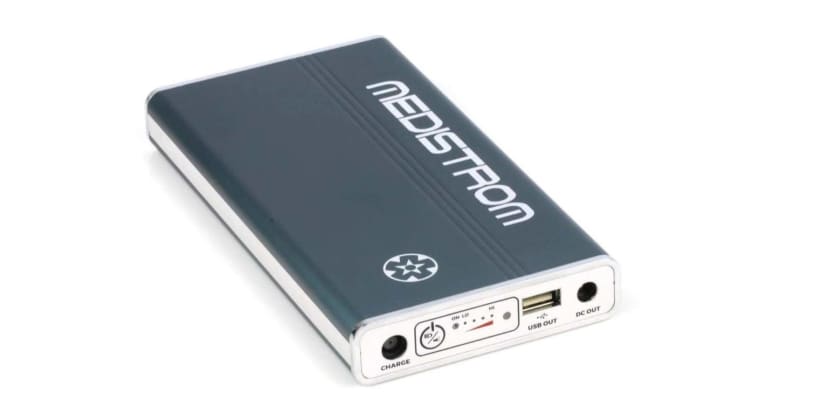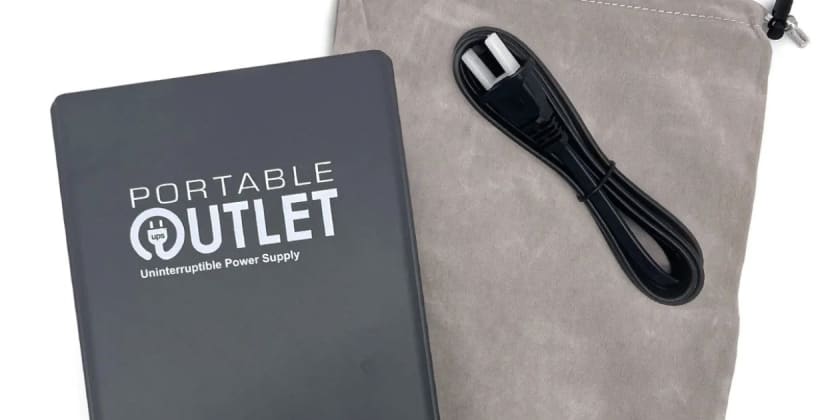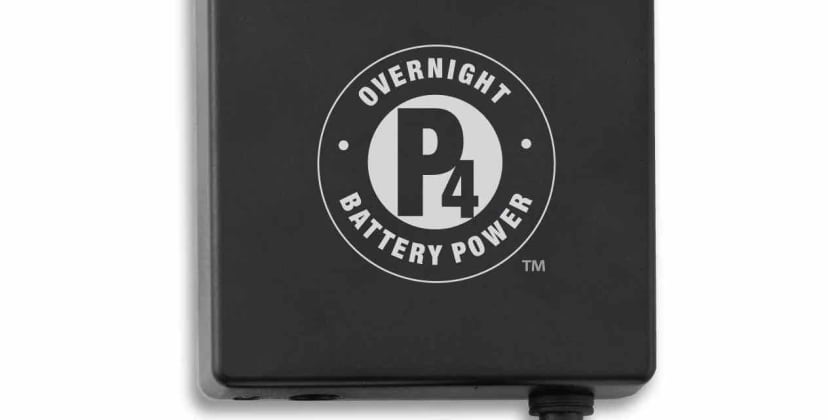When you buy through our links, we may earn a commission. Products or services may be offered by an affiliated entity. Learn more.
Best CPAP Batteries
Use While Camping or Traveling
Continuous positive airway pressure (CPAP) machines are the most common treatment for sleep apnea. Virtually all CPAP machines use a power supply that plugs into an electrical outlet. For this reason, most CPAP machines do not require batteries.
However, sometimes sleepers may need or want to power their CPAP machines by battery. For example, some sleepers may require a battery while camping or traveling to places that don’t have readily available American electrical outlets. A battery can also serve as a backup power source in the event of a power outage.
Choosing the right CPAP battery is an important purchase decision. Batteries capable of powering CPAP machines are not cheap, so you want to invest in one that is long-lasting and compatible with your specific CPAP machine.
Our Top Picks
Swipe for more
Best Overall
Medistrom Pilot-24 Lite Battery and Backup Power Supply
Use this link for the most current Medistrom discount
Use this link for the most current Medistrom discount
The Medistrom Pilot-24 Lite Battery and Backup Power Supply is compatible with a variety of CPAP machines, so it’s a good starting point for CPAP machine owners who are looking for a portable power source. We especially recommend it if you’re planning a trip of any length.

Price
$339
Full Details
The Medistrom Pilot-24 Lite CPAP Battery Backup Power Supply has a lightweight design that makes it a superior choice for home or on-the-go use. If you’ll be without power for hours at a time, this battery has got you covered.
What Does It Do?
The battery weighs 1.3 pounds, which is lighter than many competing battery models, and it measures 3.5 inches by 6.7 inches with a .78-inch thickness. The average charge lasts anywhere between 8 to 16 hours, depending on your machine settings and accessory use. Lower pressure settings result in longer charges, while accessories such as humidifiers and heated tubes will reduce the amount of usage time before you’ll need to recharge the battery.
Who Is It Best for?
The slender and lightweight design make the Medistrom Pilot-24 ideal for air travel, road trips, or vacations where you will be away from power outlets for long stretches of time. The battery is FAA-approved for use on flights. You can use the battery’s USB port to charge devices such as phones and tablets. An LED flashlight is built into the battery, in case you need a light source during a power outage. The battery is compatible with a number of CPAP units.
Shipping is free to the contiguous U.S. for purchases $99 and over, and you may return the battery in unused condition for up to 30 days after the ship date. You’ll receive a refund minus any shipping fees as well as a 15% restocking fee.
Best Backup Power Supply
Sunset Portable Outlet UPS CPAP Battery
Use this link for the most current Sunset discount
Use this link for the most current Sunset discount
The Sunset Portable Outlet UPS CPAP Battery is a reliable, long-lasting backup power supply. You can use the battery with any U.S.-made CPAP machine, and built-in auto-switch technology ensures a seamless transfer to battery power whenever you lose electricity.

Price
$350
Full Details
In the event of a power outage, a strong backup battery for your CPAP machine can mean the difference between healthy sleep and a restless, disturbance-filled night. The heavy-duty Portable Outlet UPS CPAP Battery from Sunset is durable, versatile, and equipped to keep your machine running until your power returns.
What Does It Do?
Built-in technology automatically switches your machine to battery power if your electricity goes out. Once power is restored, the machine converts back to electric power and the battery charges. A full recharge can be completed in 4 hours or less. The tri-prong AC outlet and two USB ports also let you use the battery with a wide range of CPAP devices, and the control panel has an LED meter to display how much power remains. A handy drawstring case is included with your purchase.
Who It’s Best for
The battery is rated for up to 500 charges, making the battery well suited to people who reside in places where power loss is common. Since the battery meets FAA and TSA guidelines, you can also use it mid-flight. A universal design also ensures compatibility with any U.S.-made CPAP machine.
The Portable Outlet UPS CPAP Battery is somewhat expensive, and many insurance companies don’t cover the cost of batteries, but this accessory may be a worthwhile investment if you’re concerned about power loss during your therapy. If you complete your order through The Sleep Doctor, you may return the battery unopened within 30 days of the delivery date.
Best Battery for Transcend Users
Transcend Portable Batteries from Somnetics
Use this link for the most current Somnetics discount
Use this link for the most current Somnetics discount
The Somnetics Transcend Portable Battery has an exceptionally small profile for a CPAP battery. We recommend this model for Transcend device owners who need a lightweight and compact battery.

Price
$290
Full Details
While many portable CPAP batteries are designed with smaller dimensions, the Transcend Portable Batteries from Somnetics have an especially thin profile. If you own a Transcend CPAP machine and need a portable power source that’s easy to stow, this model is an attractive option.
What Does It Do?
This compact battery from Somnetics comes in a P4 and P8 option. The P4 will power your machine for approximately 7 to 9 hours before needing to be charged, while the P8 provides up to 14 to 16 hours of power. Keep in mind that the running time will vary depending on factors such as respiratory rate and altitude. You can recharge the battery with AC or DC power cords, as well as solar power.
Who Is It Best for?
The battery’s small profile makes it perfect for Transcend users who travel frequently. Measuring 4 inches by 3 inches, the battery fits into the palm of your hand. The P4 weighs .6 pounds and the P8 weighs 1.1 pounds, so it won’t weigh down your luggage or take up too much space. If you anticipate needing a battery for extended stretches of time, you can choose the P8 for a longer running time.
Shipping is free within the contiguous U.S., and you can return the battery in unused condition within 30 days. You will receive a full refund minus shipping costs and a 15% restocking fee.
Best Overall
Medistrom Pilot-24 Lite Battery and Backup Power Supply
Use this link for the most current Medistrom discount
Shop at Sleep DoctorA reliable, long-lasting battery that’s compatible with a wide range of CPAP devices.
See More Details

Best Backup Power Supply
Sunset Portable Outlet UPS CPAP Battery
Use this link for the most current Sunset discount
Shop at Sleep DoctorA universally compatible CPAP power supply equipped with auto-switch technology for a quick and easy transition to battery power.
See More Details

Best Battery for Transcend Users
Transcend Portable Batteries from Somnetics
Use this link for the most current Somnetics discount
Shop at Sleep DoctorA power supply compatible with Transcend CPAP devices with a slim profile and lightweight design.
See More Details

How to Choose a CPAP Battery
Unless you’ve purchased a CPAP battery before, you likely feel uncertain about how to determine which battery to choose. There are a variety of CPAP-compatible batteries available on the market. Not all batteries perform equally well, however.
Knowing what to consider when purchasing a CPAP battery can help ensure you purchase the battery that will work the best for your needs and is compatible with the best CPAP machine for you.
What to Consider When Purchasing a CPAP Battery
When shopping for the best CPAP battery, consider many different factors. Most importantly, the battery you choose must be compatible with your CPAP machine. Secondly, your battery’s run time should exceed the time you spend sleeping, so your machine doesn’t lose power during the night.
Other factors vary in their importance depending on the person. For example, some sleepers are on a budget, so a lower-price battery could be important to them. Others might want to invest in a battery that’s long-lasting, so its durability and warranty could be of importance. Sleepers planning on using their battery while camping or traveling do best with a highly portable battery that charges quickly.
Be sure to consider your own unique situation and preferences when shopping for a CPAP battery. The best CPAP battery is the one that most satisfies your needs.
Machine Compatibility
Finding a battery that’s compatible with your CPAP machine is an absolute must. Not all portable batteries are compatible with all CPAP machines.
Some CPAP machine brands make their own compatible portable batteries. Be sure to research compatibility before purchasing a battery. An incompatible battery might not power your CPAP machine properly. An incompatible battery could also damage your CPAP machine.
Battery Capacity
Battery capacity is a scientific term that refers to a battery’s ability to store power. Battery capacity is usually measured in terms of milliamps per hour (mAH). Generally, batteries with a higher capacity also have a longer run time. External factors, such as temperature, can impact a battery’s capacity. Most sleepers want a battery with a higher capacity to power their CPAP machine.
Run Time
Run time refers to how long a battery can power a device. Run time is important when batteries are being used to power CPAP machines. If your battery’s run time isn’t long enough, your battery could run out of power while you’re using the CPAP machine. Most CPAP batteries provide enough power for 1 to 3 nights of sleep before they require recharging.
Some sleepers want a battery with an exceptionally long run time, so they don’t have to recharge the battery every day. Batteries with extra long run times tend to be more expensive than those with shorter run times. A long run time battery could be necessary for some sleepers camping or traveling, who can’t access a wall or car outlet every day during their travels.
Charge Time
Charge time refers to how long a battery takes to recharge. Charge time can be important, especially to people using a CPAP battery while traveling. When a person isn’t in one single place or near an outlet all day, having a battery that charges quickly is required so it can become fully charged. If a battery isn’t fully recharged during the day, its run time will be diminished, and it might not be capable of powering a CPAP machine all night long.
Portability
Portability matters to sleepers wanting a CPAP battery so they can use their CPAP machines while camping or traveling. Size, weight, and design impact the portability of a CPAP battery. Smaller batteries take up less space in a bag, which is a plus, especially when traveling in situations that limit luggage space. Lighter-weight batteries help keep bags light, which is important when camping or in other travel situations that require a person to carry their luggage for longer distances.
Durability
The more durable a battery is, the longer lifespan it will likely have. Some battery manufacturers share how long their battery is guaranteed to last in terms of how many times it may be recharged. Durability refers to more than just lifespan, however. The design and shape of a battery also factor into its durability. A durable battery won’t break easily or become damaged through regular use.
Price
People on a budget care about the price tag associated with their CPAP battery. CPAP batteries generally run between $200 and $600. Unfortunately, less expensive batteries often do not perform as well, and typically have shorter run times and longer charge times. Of course, this is a generalization and not a rule. Sleepers shouldn’t make assumptions about the quality of a battery or decide which battery to purchase based on price alone.
Warranty
Most CPAP batteries come with a 1-year manufacturer’s warranty. Generally, these 1-year warranties cover defects in the battery but not damage or problems caused by use. Sleepers seeking a CPAP battery should familiarize themselves with details of the manufacturer’s warranty before making a purchase.
CPAP Machine Battery Compatibility
Purchasing a battery that’s compatible with your CPAP machine is of utmost importance. If you purchase a battery that isn’t compatible, it could damage your machine or simply not work.
We’ll highlight popular CPAP machine models and batteries compatible with each machine type.
| CPAP Machine Model | Compatible CPAP Battery |
|---|---|
| DreamStation | Portable Outlet CPAP Battery Philips Respironics Travel Battery Kit EXP96 Pro Lithium Ion Battery Bank EXP48 Pro Lithium Ion Battery Bank BPS Freedom Travel Battery With the DreamStation 12V Power Converter BPS Freedom V2 Travel CPAP Battery + Machine Cable Kits |
| DreamStation Go | Portable Outlet CPAP Battery DreamStation Go Overnight Battery BPS Freedom Travel Battery With the 150W Sine Wave Inverter Medistrom Pilot-24 Lite With the Adapter |
| ResMed AirMini | Portable Outlet CPAP Battery Medistrom Pilot-24 Lite EXP96 Pro Lithium Ion Battery Bank EXP48 Pro Lithium Ion Battery Bank BPS Freedom Travel Battery With the 150W Sine Wave Inverter BPS Freedom V2 Travel CPAP Battery + Machine Cable Kits |
| ResMed AirSense 10 | Portable Outlet CPAP Battery EXP96 Pro Lithium Ion Battery Bank EXP48 Pro Lithium Ion Battery Bank ResMed Power Station II Battery Kit Medistrom Pilot-24 Lite BPS Freedom V2 Travel CPAP Battery + Machine Cable Kits |
| HDM Z2 | Z2 PowerShell Extended Battery EXP96 Pro Lithium Ion Battery Bank EXP48 Pro Lithium Ion Battery Bank BPS Freedom Travel Battery With the 150W Sine Wave Inverter |
Inverters
Inverters allow sleepers to recharge their portable CPAP battery using a DC car outlet rather than a standard wall outlet. Since nearly all American electrical systems use AC power, CPAP batteries are recharged by AC power. Vehicle electrical outlets put out DC power, however. An inverter is required to transform DC power into usable AC power.
If you’re always able to charge your CPAP battery using a wall outlet, you don’t need an inverter. An inverter is useful to people who want to recharge their CPAP battery from within a vehicle. People bringing their CPAP machine camping or on road trips often find an inverter crucial, since they don’t have access to wall outlets on a daily basis while traveling.
When people shop for CPAP batteries for the first time, they often have questions. We’ll answer the most frequently asked questions, so you can feel confident as you shop for a battery to power your CPAP machine.
Frequently Asked Questions
How long will a battery power a CPAP machine?
Generally, a fully charged portable battery will power a CPAP machine for anywhere from 8 to 24 hours. How long any specific battery can power a CPAP machine depends on the battery’s capacity and run time.
Many CPAP battery manufacturers share how long their fully charged battery can power a CPAP machine. If you’re considering a battery from a manufacturer that doesn’t share this information, take time to read customer reviews. Often, existing customers who have purchased CPAP batteries comment on the battery’s run time in their reviews.
Are CPAP batteries covered by insurance?
No, most of the time, CPAP batteries are not covered by insurance. Unfortunately, most health insurance companies do not consider CPAP batteries medically necessary. Since a CPAP machine already comes with a power supply that plugs into a wall outlet, a portable CPAP battery is often viewed as an optional accessory.
Still, if you have health insurance, it may still be worth calling your insurance company to inquire about CPAP batteries. Although most do not, some insurance companies do cover a portion of the cost of batteries.
Can you use a car battery to power a CPAP machine?
Although it is possible to power a CPAP machine with a car battery, it could be risky. You would need to use alligator clips to connect an inverter directly to the battery. Additionally, car batteries are large and heavy, making them impractical for travel.
You could use a car battery to power a CPAP by plugging the machine into an inverter connected to a car’s outlet, but this setup also isn’t ideal. You would then need to sleep in the car to stay near the outlet. Also, if you turned the car engine off, powering the CPAP machine would eventually drain the car’s battery.
Do you need a prescription for a CPAP battery?
No, you do not need a prescription to purchase a CPAP battery. Generally, CPAP batteries are sold to the general public directly, through websites and from medical device companies. Most pharmacies do not sell CPAP batteries and prescriptions are unrelated to the CPAP battery buying process.
Most health insurance companies do not cover CPAP batteries. That said, some insurance plans do cover or partially cover CPAP batteries. If your insurance company is one of the few that covers CPAP batteries, you would need to provide medical proof that you require a CPAP machine to have your battery purchase covered. You would not need a prescription.
Can you charge a CPAP battery in the car?
Yes, you can charge a CPAP battery in the car using an inverter. Most CPAP batteries do not plug into a car’s outlet directly. Cars contain a DC outlet, while most batteries require AC power to recharge. An inverter takes the DC electricity from the car outlet and turns it into AC power, which can safely recharge the CPAP battery.

Still have questions? Ask our community!
Join our Sleep Care Community — a trusted hub of product specialists, sleep health professionals, and people just like you. Whether you’re searching for the perfect mattress or need expert sleep advice, we’ve got you covered. Get personalized guidance from the experts who know sleep best.


